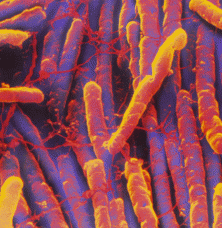A new systematic review shows that probiotic prophylaxis can prevent Clostridium difficile-associated diarrhea, one of the most problematic side-effects antibiotic drugs.
The review compiled data from 20 trials representing 3,818 children and adults treated with antibiotics and taking probiotics, placebo, or no treatment. Probiotic species included Lactobacillus (L. acidophilus, L. casei, L. plantarum, L. rhamnosus GG), Saccharomyces (S. boulardii, S. thermophiles), and Bifidobacterium, with combinations of species in 7 trials. Seven of the 20 trials studied combinations of probiotic species.
Probiotic treatment lasted for the duration of antibiotic treatment in 7 trials and for up to 14 days  post-antibiotics in the remaining trials. The probiotic dose was > 10 billion colony-forming units/day in 18 trials.
post-antibiotics in the remaining trials. The probiotic dose was > 10 billion colony-forming units/day in 18 trials.
Overall, probiotic treatment reduced C. difficile-associated diarrhea by 66% (relative risk 0.34, 95% CI 0.24-0.49). The number needed to treat, to prevent one episode of C. difficile ranged from 27-40 between the various trials (DynaMed level 1 [likely reliable] evidence). S. boulardii, L. acidophilus, and L. casei appeared to be the most effective probiotic species for preventing C. difficile (Johnston BC, et al. Ann Intern Med 2012 Nov 13 early online).
The incidence of C. difficile-associated diarrhea was significantly reduced with S. boulardii in analysis of 6 trials with 1,232 patients and with a combination of L. acidophilus and L. casei in 3 trials involving 781 patients.
There were no significant differences in adverse events between patients treated with probiotics and those on placebo.
In 3 trials involving 605 children, probiotics nearly eliminated C. difficile-associated diarrhea (relative risk 0.4, 95% CI 0.17-0.96, NNT 20-417 with diarrhea in 6% of controls).
Probiotics have previously been shown to reduce rates of antibiotic-associated diarrhea in a large number of trials and systematic reviews (e.g. Aliment Pharmacol Ther 2012 Jun;35(12):1355, Cochrane Database Syst Rev 2011 Nov 9;(11):CD004827). C. difficile is of particular concern because it sometimes causes colitis and death.
The current review, headed by Bradley Johnston, PhD, of the Hospital for Sick Children, Toronto, indicates that in a majority of cases, this can be prevented by a relatively inexpensive and very safe modality.
Thanks to our friends at DynaMed for bringing this important paper to our attention.
END








